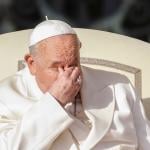In my previous post, The ‘Gods’ of Left and Right, I started my analysis of the ancient practice of expressing theology in political terms, and for civic utility, by demonstrating how liberal theology constructs a political “God” of the Left. In that post, I focused on the God modern philosophers like Hegel, and later A.N. Whitehead, envisioned. This is a God who is himself in a historical process of becoming. As such, this God is not maximally perfect in Being. This philosophical assumption is the basis for all, or almost all, contemporary progressive Christianity. God, like us, is growing up and maturing in time. In fact, God is doing this through us. This view of God’s ontology has serious ramifications for how progressive Christians conduct politics.
In this post, however, I will fulfill my promise from the last article to be an “equal-opportunity” heresy hunter. Thus, I now turn to the political God of the Right. In so doing, I shift my critical lens from ontology to epistemology. The God of the Right is, for the most part, metaphysically correct. Most Right-Wing Christians do see God as eternal, uncreated, immutable, transcendent and, most relevant here, universal and fixed with regard to His moral commands. Where the Right falters however, especially the current MAGA-Right, is in its knowledge claims. The Right-Wing God is a God that emerges out of a serious epistemic error.

Right-Wing “Apostles” and “Prophets”
On February 7th, 2025 President Trump appointed Paula White-Cain to the role of Senior Adviser for the newly created “White House Faith Office.” For those unfamiliar with White, what matters most about her theologically is her acceptance of the role of “prophet” in a movement that has been rightly labeled, “The New Apostolic Reformation.” Author and colleague, Holly Pivec, has spent over a decade researching the NAR movement. In her book, Reckless Christianity, co-authored with Doug Geivett, she says this about White:
During Trump’s term in office, NAR leaders, including many from Bethel Church [in Redding, California, an influential NAR church], gained unprecedented access to the White House. This was certainly due in part to their ministry connections with Trump’s spiritual advisor, Paula White. White, a well-connected televangelist and prosperity gospel preacher, is known as an apostle who concurs with much Bethel Church and NAR theology.
White announced in 2019 that she would pass direct leadership of her church, City of Destiny in Apopka, Florida (formerly New Destiny Christian Center), to her son, Brad Knight. She would then function as a governing apostle over the church. However, she said, she would not adopt the title “apostle” since a title like that may be misunderstood. She favored, instead, the designation “oversight pastor.” Moments after her announcement, her son told her publicly, “You truly are an apostle. And the quicker that people realize that God has granted you favor and authority, and unique favor and authority, the better off that they’ll be.” In response, Paula White was seen nodding in apparent agreement. (See White and Knight, “We are streaming live!” [30:00].) So, although White does not speak of herself as an apostle, she apparently does view herself as one, as does her church leadership.
The concern with the NAR movement, to which White and others who surround Donald Trump (e.g. Jeremiah Johnson, Kris Vallotton, Shawn Bolz, Mark Taylor) clearly belong, is its main claim that there are specially anointed prophets and apostles operating today. These prophets and apostles operate in similar fashion to those prophets and apostles of the Old and New Testament. According to NAR, the terms “prophet” and “apostle” are referring not to spiritual gifts (cf. Rom 12:6-8; 1 Cor 12:8-10, 29-30; and Eph 4:11), as some might naively assume. At least, it is not to spiritual gifts alone that they refer. It may be to spiritual gifts, or charisms, but it is more than that. For many in the NAR movement, the referents of the terms are the actual offices of prophecy and apostleship. This is a crucial distinction that needs unpacking.
In their previous book on NAR, Counterfeit Kingdom, Pivec and Geivett quote a former missionary, “Dean.” Dean’s church was taken over by NAR prophets:
The whole movement rests on the giant claim that God Himself is restoring the offices of apostle and prophet and the entire body of Christ must submit to their authority or else miss out completely in the ‘new’ move of God. If that claim is false, the entire movement crumbles.
The key difference between an office and a charism has to do with authority, specifically with epistemic authority. Prophets and apostles in the Old and New Testament had special authority. They could reprimand and correct the community of God, in the Old Testament the nation of Israel. Or they were called to guide and shape its doctrine and its practices, as in the New Testament Church. However, these prophetic and apostolic offices were more than just spiritual gifts, even if they were obviously filled by men and women who had those gifts.
But the offices were authoritative positions, and that on account of a) a special selection of those prophets and apostles by God, and b) because of that selection, the existence of an intimacy between the prophet or apostle with God that related to divinely revealed knowledge. In short, God chose people to reveal very particular truths about God, or God’s plans, to the world. We should note that these people (e.g., Abraham, Moses, Jeremiah or Paul, John, Peter) were not chosen for any inherent quality they possessed. They were simply chosen.
In the case of the Apostles this knowledge came directly to them through Jesus Christ, either in his pre or post-resurrection person. In the Jewish tradition most of the Tanakh, the Old Testament, is called by the title of either “former” or “latter” prophets (it being understood that the Torah was the work of the prophet Moses). Only the Writings, the Ketuvim, are not considered prophetic books. At least, not in the strict sense. The New Testament, similarly, comprises the witness of the Apostles, the companions of Jesus, plus Paul, who Jesus appeared to directly on the Damascus road.
Prophets and Apostles chosen by God in the Old Testament and New Testament were uniquely authoritative in their role as messengers of divine revelation. It is their words that we read in the Bible, which, once they were committed to writing, is what makes the Bible the ultimate and final source of divine, forensic revelation. By “forensic” I mean a public and open revelation about God to all people for all time.
This is why we call the Bible an inspired book, as we believe the Holy Spirt breathed into the lives of its authors to record the actual revelation of God, almost all of which came through those who filled the office of prophet or apostle (although, some through other means as well). However, these official callings of prophet and apostle passed away with the generation of Jesus’ Apostles and the ontological completion of the Holy Scriptures, i.e., with the writing of the Book of Revelation.
Spiritual Gifts versus Prophetic Offices
While some Christians believe that the spiritual gifts of prophecy and apostleship also ended with the last of Jesus’ Apostles, others believe the gifts continued in spite of the offices ceasing. Either way, the claim that the authoritative offices themselves have been reinstated by God is itself one that cannot be tested by Scripture. How could it be? After all, it is a claim that makes itself equivalent, or even superior, to the authority of the Scriptures themselves.
If one claims to be in the office of prophet or apostle, then I am claiming to be in the same epistemic position vis-a-vis God as those whose words are recorded for us in the Bible. Were it true, for example, that I was an official prophet or apostle, then my proclamations would be of the same authority as anything recorded in the Scriptures, since authentic prophecy from God and genuine apostolic witness to Jesus just is what comprises the material content of the Bible (also known as “the material principle”).
As such, while the content of specific prophecies can be checked against the Bible, as well as the character of the purported prophet, the claim to be in the office of prophecy is one that cannot be directly challenged by the Scriptures. It could be indirectly challenged, via the commonplace inquiry of “show me where,” but it could not be definitively ruled out. This makes it incredibly dangerous, especially if the self-proclaimed prophet or apostle does come working wonders or miracles (something that almost all NAR apostles and prophets seek to do). Of course, this is also something the Bible explicitly warns us about! (cf. Mark 13:12, 2 Pet 2:1-3; 1 Jn 4:1).
Biblically speaking, the few verses that NAR prophets and apostles, like Paula White, use to ground their claims of authority, e.g., Eph 2:20, 4:11 or 1 Cor 12:18, simply do not speak of ongoing offices. Nor do they talk of some future reinstatement of those offices, so long as one reads them in context. In sum, Pivec and Geivett argue:
Other than the apostles of Christ (most notably, the Twelve and Paul, who held an exclusive office in the early church), the only two church offices that are clearly identified in the New Testament are elders/overseers (what many churches refer to today as ‘pastors’) and deacons.
There is much more that could be said about the New Apostolic Reformation, their false claims of authority and their supposed access to special revelation of God. Since I have spoken to the authors several times about NAR, I would refer you to our detailed discussion about these false prophets and apostles here, or watch this video of Doug and Holly debating a leading NAR-defender, Michael L. Brown here.
My main point in this post, however, is to point out that the heretical view of this movement, a movement very much associated with the MAGA Right-Wing, revolves around a serious epistemic error. That error is a claim to special knowledge, which itself is grounded in another claim, a claim to unique authority. However, this claim cannot be validated by the main source of epistemic justification for the Christian– the Bible.
In contrast with the Left-Wing God of liberal theology, this Right-Wing God is not based on a theological error of the first order. The Left-Wing God gets God wrong. It maligns the very nature of God. The Right-Wing God of NAR prophets and apostles gets God right (sort of), but it gets God’s people, the Church, wrong. It is an error in ecclesiology, and one that relates, as I pointed out above, to knowledge, not to being.
The Right-Wing God of Power and Prosperity
However, there is one way in which the heretical theology of NAR also gets God wrong. This is on account of another theological distortion that NAR “prophets” and “apostles” often assume into their already defective system. It is out of the synthesis of two theological errors that the current Right-Wing God is produced.
In another article I wrote about the religious upbringing of Donald Trump. Trump, and his parents, were acolytes of one of the early prosperity preachers, Norman Vincent Peale. Just the title of Peale’s bestselling book, The Power of Positive Thinking, gives us an idea of the kind of “gospel” that Peale appealed to (pun intended). Peale was one of the forerunners in a long line of “Protestant” Christians who have become knowns as “Prosperity Gospel” preachers.
The big idea of the Prosperity Gospel is that God only desires to bless us, and that in virtue of simply professing Christ (more like “manifesting” Him) we can claim those blessings. Those blessings, by the way, are mostly, if not exclusively, material in nature. They are the kinds of things we would otherwise desire, “in the flesh,” as Paul might say: money, prestige, influence.
This Power and Prosperity Gospel of Peale coupled together with the claims of prophetic authority by the men and women of NAR, like White, Lance Wallnau or Bill Johnson, have combined to make for a very toxic theological stew. And, it is this stew that has been feeding both Donald Trump and much of the MAGA Right (although certainly not all of it).
The “God” that this theology produces is a God that acts more like a genie in a bottle: a god that only wants to grant our wishes, that never corrects or disciplines, but only aims to bless, yet who needs specially chosen human authorities to “activate” his power. This Right-Wing God would never allow suffering, let alone require or demand repentance for sin. This is why Donald Trump was, infamously, able to say in front of fairly orthodox Christian student body that “he had never asked God for forgiveness.”
The One Commonality between The Left and Right-Wing God
If there is one thing common to both the god of the Left-Wing Liberalism and MAGA-Style Rightism it is this: the neglect or rejection of the need for repentance before a holy and all-good God. While both sides use their version of God to attack the other politically, both fail equally to preach their own need to repent and be forgiven. On the liberal side, God is simply okay with the current morality that liberals profess. This is regardless of any biblical commands. Human beings and their current moral sensibilities are, on this view, simply representative of a historically progressing god and his moral values. Thus, there is no need for the sexual deviant, the breaker of federal law, or the aborter of babies to repent and be forgiven. Whatever the moral teachings of progressives are today are identical to the moral values of “the divine” right now.
Similarly, for the god of the Right-Wing, there is no need to repent either. If one believes God only blesses, then what for? At most one might have to do something for God to bless, something transactional. But if all we need to do is “profess the name of Jesus” and believe hard enough to get what we want, and if “authoritative” prophets are telling us as much, then what’s the point of admitting our sins, let alone seeking forgiveness and turning from them?
Finally, there is another assumption often made by the Right, one that seems to mirror an assumption made by the ancient Israelites. That is that America is not only a chosen people, but a chosen people in virtue of something inherent to Americans. American exceptionalism, however, has nothing to do with anything inherent. It has to do with God’s blessings, to be sure, but those blessings came in the form of a system of jurisprudence and a structure of governance that was exceptional. While we can agree with Right-Wing MAGAites that God has blessed America, and pray He might continue to do so, the orthodox, historical Christian would have to part ways with any theology that might suggest that America is especially chosen, or, more precisely, has been blessed on account of some inherent goodness. In the end, all is grace.
















